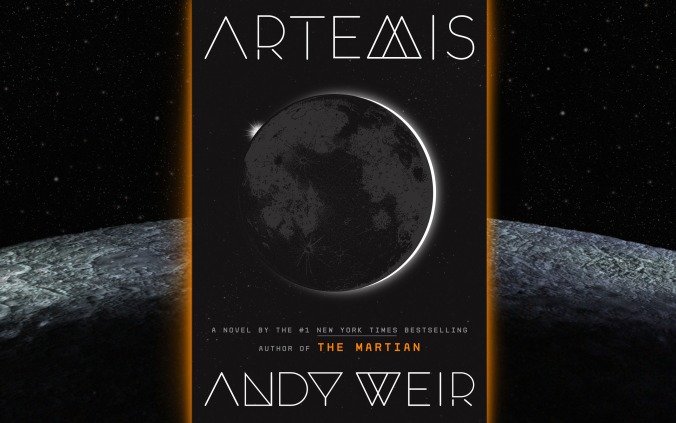Part of the fun of The Martian, Andy Weir’s best-selling debut, was how it took the hard sci-fi conceit of an astronaut stranded on the red planet and made the alienating desolation relatable through its goofball everyman protagonist. As it turns out, Mark Watney’s voice may actually just be that of Andy Weir—or at least the only point of view he’s capable of articulating in written form. Artemis, his sophomore novel, takes that same genial dad-joke personality and superimposes it onto a main character who’s supposed to be a take-no-shit brilliant young woman. The results are so clunky, Watney himself couldn’t jerry-rig them into functioning. The book reads like the first draft of a space-set crime thriller that has no clue how women think—or perhaps Weir just believes that, deep down, we’re all one pun away from sounding like Tom Hanks in Larry Crowne.
There are surely real women out there who possess the same wheezing sense of humor and adolescent-male attitude of Jazz Bashara, the protagonist of this story, but they’d be hard-pressed to recognize themselves in this painfully one-note impression of what’s ostensibly a human woman. Having grown up in Artemis, the moon colony in which she toils as a working-poor courier (while making her real money as a dealer, selling illegal imports smuggled from Earth), Jazz continually reminds herself that she’s a woman, though whether it’s for the audience’s benefit or so Weir himself doesn’t forget is anyone’s guess. Here are some examples of Jazz’s narration—keep in mind, we’re repeatedly told just how searingly intelligent and clever this character is, by nearly everyone around her:
- “I giggled like a little girl. Hey, I’m a girl, so I’m allowed.”
- “I had to be a big girl—just for one minute. I didn’t have to like it, but I had to do it.”
- “I was a helpless, exposed girl with no weapon.”
- “I looked down. I was still wearing just the shirt I’d liberated from his closet. I was pretty sexy, I have to admit.”
- “I gave him a high five (can’t leave a fella hanging).”
- “I threw off my clothes like a drunk prom date.”
- “The bartender returned with my drink. I took a sip. Oh, man…good stuff.”
Time and again, Jazz comes across less like a smart and resourceful woman, and more like Mark Watney’s been beamed into the body of a twentysomething Muslim woman. And then given a minor lobotomy. She’ll reference Buster Keaton, then utter bizarrely juvenile statements about her passion for gossip sites. If it’s meant to convey someone with many facets to their personality, it fails utterly. Jazz is the sentient version of a lazy youth-pandering marketing campaign—the written equivalent of a middle-aged guy with a ponytail and leather jacket. It’s amazing she doesn’t try to rap at some point. She would doubtless begin with, “My name is Jazz and I’m here to say…”
It’s too bad, because the rotten characterization that ruins Artemis is paired with the clear-eyed gift for scientific exposition that is apparently Weir’s strong suit. Any time Jazz is explaining in plain language the complex nature of life on the moon, detailing the plausible ways human existence on the satellite would need to function, the book gains a little of the engaging general-interest science that powered so much of The Martian. From the spherical habitats that compose the lunar city to the explorations of daily life somewhere with six times less gravity than our own planet, the frisson of technical detail creates some minor enjoyment, at least until Weir kills the mood with another off-putting or anachronistic reference, or ongoing assumption the reader is exactly like him. (After describing Muslim clothing, Jazz tells us, “Okay, you can stop pretending you know what a niqab is.”)
The book’s plot is boilerplate crime drama, transplanted to the sci-fi setting. Jazz is approached by a billionaire with a risky plan: He’ll set her up financially for life if she agrees to sabotage the machines that provide oxygen to the city, thereby allowing him to take over the contract. Very soon, however, Jazz is dodging cartels and cops alike, and realizing she has fallen into the middle of a massive power play between gangs and businessmen that could threaten the city itself. The action, as in The Martian, receives competent treatment, sometimes quickening the pace of the story with a well-timed explosion or crisis. But just as often, Weir gets in his own way, interrupting a tense scene with some ham-fisted bit of allegedly young-and-hip dialogue that makes Jazz (or one of the other, equally thinly drawn characters) sound like a suburban father who can’t understand why his kids want him to drop them off a block away from school.
As it turns out, there was a very good reason for The Martian to be about someone who is literally the only person on the planet: Weir isn’t very good at creating any believable human interaction, or even characterization, above all when it involves someone the slightest bit different from his original dorky but genial white guy protagonist. It’s not a shock the most plausible character in Artemis is a socially clueless scientist guy with no sense of how other people think or behave. Were that gentleman to try his hand at writing a lunar-based crime novel, he’d likely come up with something close to this misbegotten story in which he sort-of exists.
Purchasing Artemis via Amazon helps support The A.V. Club.









































